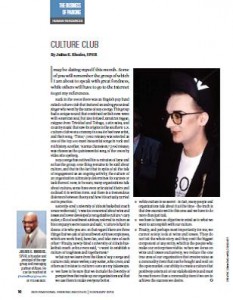I may be dating myself this month. Some of you will remember the group of which I am about to speak with great fondness, while others will have to go to the internet to get my references.
Back in the 1980s there was an English pop band called Culture Club that featured an androgynous lead singer who went by the name of Boy George. This group had a unique sound that combined British new wave with American soul, but also infused Jamaican reggae, calypso from Trinidad and Tobago, Latin salsa, and country music that saw its origins in the southern U.S. Culture Club won a Grammy in 1984 for best new artist, and their song, “Time,” (1982 release) was selected as one of the top 500 most influential songs in rock and roll history. Another, “Karma Chameleon,” (1983 release) was chosen as the quintessential song of the 1980s by video site Ryeberg.
Boy George has outlived his 15 minutes of fame and so has the group. One thing remains to be said about culture, and that is the fact that in spite of all the talk of engagement as an ongoing activity, the culture of an organization ultimately determines its success or lack thereof. Now, to be sure, many organizations talk about culture; some have even articulated theirs and codified it in written form. But there is a tremendous difference between theory and how it is actually carried out in practice.
Recently-fired University of Illinois basketball coach Bruce Weber said, “I was too concerned about wins and losses and never developed a recognizable culture.” Gary Keller, CEO of Southwest Airlines, referred to culture as his company’s secret sauce and said, “Culture is hard to define. It is who you are. In that regard there are three things that we ask of all Southwest Airlines employees, which are work hard, have fun, and take care of each other.” Finally, newly-hired University of Illinois basketball coach John Groce said, “I want to establish a culture of toughness and togetherness.”
What can we learn from the likes of Boy George and Culture Club, Bruce Weber, Gary Keller, John Groce, and others as it relates to culture? Here are my takeaways:
We have to be sure that we include the diversity of perspectives that make up our organizations and that we use them to make everyone better.
While culture is no secret—in fact, many people and organizations talk about it all the time—the truth is that few execute well in this area and we have to do more than just talk.
We have to have an objective in mind as to what we want to accomplish with our culture.
Finally, and perhaps most importantly for me, we cannot solely look at wins and losses. They do not tell the whole story and they omit the biggest component of any entity, which is the people who make our enterprises viable. When we focus on wins and losses exclusively, we reduce the one true area of our organization that creates value as a commodity item that can be bought and sold on the open market. Our ability to create a culture that positively affects all of our stakeholders is and must be much more than a commodity item if we are to achieve the success we desire.
Julius E. Rhodes, SPHR, is founder and principal of the mpr group and managing partner of Axeo. He can be reached at jrhodes@mprgroup.info or 773.548.8037

